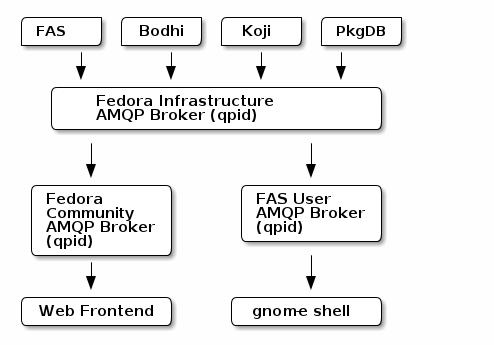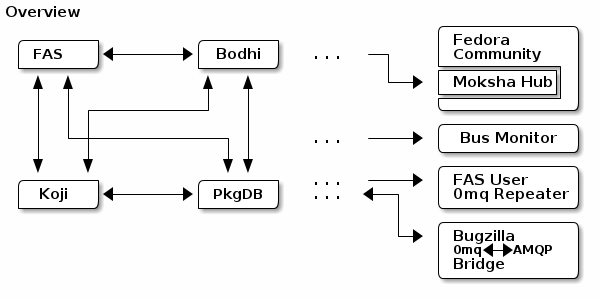fedmsg
Nicolas Dandrimont
olasd@debian.org
5th October 2013
Table of Contents
A bit about myself
In the free-software world
Free software user since the early 2000's
Debian packager since 2011, developer since 2013
GSoC mentor for Debian since 2012, admin in 2013
mentors.debian.net admin (code + system) since 2012
Otherwise
Sysadmin for a student ISP, 2007-2012
Sysadmin for a French University, since 2012
The problem with distro infra
Services are like people
Dozens of services, developed by many people
Each service has its own way of communicating with the rest of the world
Meaning that a service that needs to interact (yep, that's all of them) will need to implement a bunch of communication systems
Debian infrastructure comms
dak, our archive software, uses emails and databases to communicate. Metadata is available in a RFC822 format, no real API (the DB is not public either)
wanna-build, our build queue management software, polls a database every few minutes to know what needs to get built. No API outside of its database
debbugs, our bug tracking system, works via email, stores its data in flat files, and exposes a read-only SOAP API
SCM pushes in the distro-provided repos (on alioth) can trigger an IRC bot (KGB), some mails. No central notification mechanism
Fedora infra before fedmsg
In the packaging pipeline: transition from service to service:
- Either done by a developer
- Or some ad-hoc hooks would trigger the next service in the pipeline
…
Not maintainable
Adding new services is annoying (you need to touch everything)
Some kludges are available
UDD (the Ultimate Debian Database)
Contains a snapshot of a lot of the databases undelying the Debian infrastructure at a given time (even some Ubuntu bits)
A lot of cron-triggered importers
Useful for distro-wide QA purposes, not so much for real-time updates
The PTS (Package Tracking System)
http://packages.qa.debian.org/ (and http://pts.debian.net)
Cron-triggered updates on source packages
Subscribe for email updates on a given packages
Messages not uniform, contain some headers for filtering and machine parsing
Not real-time
A proposed solution: fedmsg
What is fedmsg?
Jesse Keating's talk in 2009 at NorthWest Linux Fest
A unified message bus, reducing the coupling of interdependent services
Services subscribe to one (or several) message topic(s), register callbacks, and respond to events
What you get (almost) for free
- A stream of data representing the infrastructure activity (stats)
- De-coupling of interdependent services
- Desktop notifications for devs
- Live web dashboard of events
- IRC feeds (#fedora-fedmsg @ freenode, #debian-fedmsg @ OFTC)
- identi.ca and twitter accounts that get banned for flooding :-)
fedmsg inception
First candidate: AMQP

Issues:
- SPOF at the central broker
- brokers weren't very reliable
Actual message bus: 0mq

No broker, each service binds to a port and starts publishing messages
Other services connect to those ports and start consuming messages
Advantages
- No central broker
- 100-fold speedup over AMQP
Main issue with a brokerless system: service discovery
Three options
- Writing a broker (→ hello SPOF)
- Using DNS (most elegant solution)
- Distribute a text file
Fedora uses option #3, and the Debian GSoC student implemented option #2
Using the bus
Bus topology

Message topics
Event topics follow the rule:
org.distribution.ENV.SERVICE.OBJECT[.SUBOBJECT].EVENT
Where:
- ENV is one of dev, stg, or production.
- SERVICE is something like koji, bodhi, mentors, …
- OBJECT is something like package, user, or tag
- SUBOBJECT is something like owner or build (in the case where OBJECT is package, for instance)
- EVENT is a verb like update, create, or complete.
Publishing messages
From python:
import fedmsg fedmsg.publish(topic='testing', modname='test', msg={ 'test': "Hello World", })
From the shell:
$ echo "Hello World." | fedmsg-logger --modname=git --topic=repo.update $ echo '{"a": 1}' | fedmsg-logger --json-input $ fedmsg-logger --message="This is a message." $ fedmsg-logger --message='{"a": 1}' --json-input
Receiving messages
From python:
import fedmsg # Read in the config from /etc/fedmsg.d/ config = fedmsg.config.load_config([], None) for name, endpoint, topic, msg in fedmsg.tail_messages(**config): print topic, msg # or use fedmsg.encoding.pretty_dumps(msg)
In the shell, you can use the fedmsg-tail command (demo time)
Goodies
- All the stuff listed in What you get (almost) for free is implemented
- Cryptographic message signing: either via X.509 (Fedora) or GnuPG (Debian, implemented during GSoC13)
- Replay mechanism: detect if a message was missed (sequence id mismatch) and ask the sender for the remaining messages (implemented during GSoC13)
Wrap-up
Status of deployment
In Fedora: fedmsg is used in production for more and more infra services (see the Gamification talk by Haikel later)
In Debian: Simon wrote mail gateways to get package uploads and bug changes on a stub-bus. Infrastructure integration is mostly blocking on me not having enough time to discuss the specifics with our sysadmin team
What's next
More distros adopting the fedmsg bus?
Cross-distro messaging?
fedmsg gives a new meaning to an "open infrastructure"!
Next session, other Distro track room: fedmsg workshop: please come play with the bus!